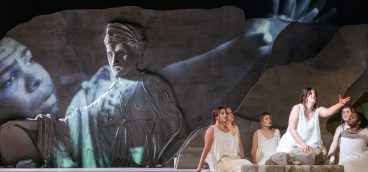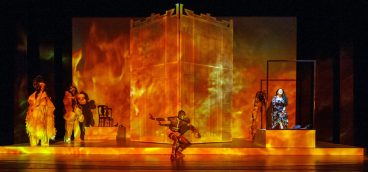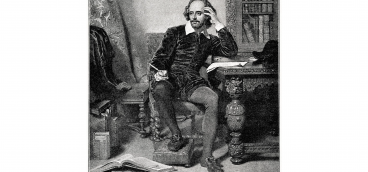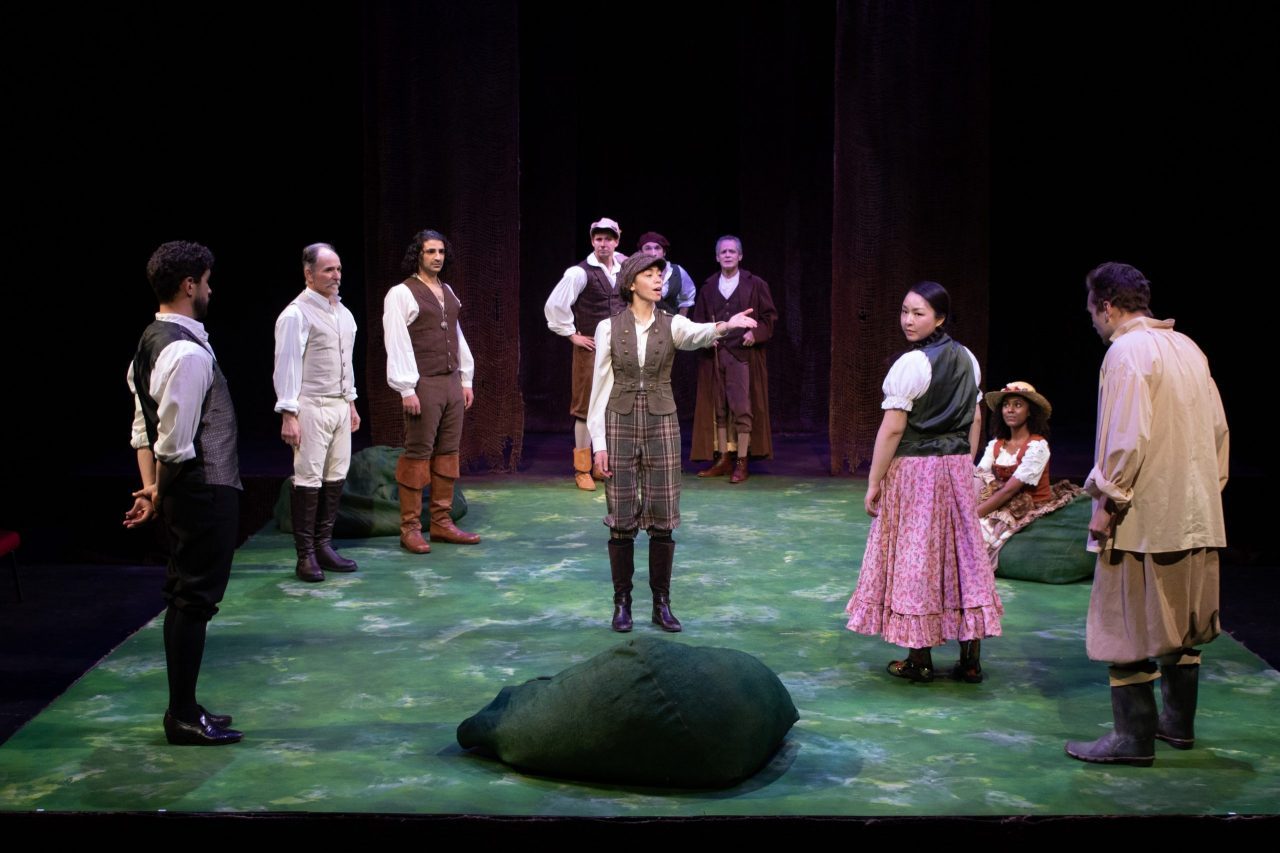
An Enchanting Evening in Another World: Chatham Baroque Transports Us to the Realm of Bach
Several years ago, when I lived in Cambridge, I happened to sit next to an eccentric man on a flight to Boston, who had a large musical instrument occupying the seat next to him. Suspecting that it wasn’t a cello, I asked what it might be, and he said a viola da gamba. I replied, …

Barebones Delivers a Visceral Portrayal of Working America in “Skeleton Crew”
Usually, critics try to bury the lead, but I’m going to say outright that Barebones Productions may be the most authentic theater company in America today. This is not to denigrate any other company, nor to say that Barebones is the best theater company, but what they have done over the past couple of years …
Barebones Delivers a Visceral Portrayal of Working America in “Skeleton Crew” Read More »

Pittsburgh Opera Goes Back to the Future with a Moving “Iphigénie En Tauride”
The conceit of the “what if” story has always fascinated us: what if Ebenezer Scrooge hadn’t been visited by his ghosts in Dickens’ “A Christmas Carol,” or if George Bailey hadn’t had the intervention of the angel Clarence in “It’s a Wonderful Life,” or if Marty McFly hadn’t gone back in time to make sure …
Pittsburgh Opera Goes Back to the Future with a Moving “Iphigénie En Tauride” Read More »

Buying Fragments of God: The Crazy Art World of the 1980s
If the 1960s changed America’s consciousness for the better, the 1980s certainly changed American commercialism for the worse. And to have lived during this latter period in New York City was to have felt the first tremors of this change, much like living near the epicenter of an earthquake and experiencing its initial shockwaves before …
Buying Fragments of God: The Crazy Art World of the 1980s Read More »

Barebones’ “American Buffalo” is Stunning and Revelatory Theater
In trying to describe the essence of strong writing – and ultimately, all art — the poet Wallace Stevens said, “A grandiose subject is not an assurance of a grandiose effect, but most likely, the opposite.” What we have in David Mamet’s “American Buffalo” (1975) is the embodiment of this ethos, as the play brings …
Barebones’ “American Buffalo” is Stunning and Revelatory Theater Read More »

The Rebellious Spirits Still Haunting Pittsburgh
Some historical events seem so fantastical that they sound like myths when retold, while others are so intrinsic to our nature that they could be today’s news, and actually help us understand our contemporaneous existence more deeply. After reading The Whiskey Rebellion: A Distilled History of an American Crisis by Brady J. Crytzer, I would …
The Rebellious Spirits Still Haunting Pittsburgh Read More »

The Stark Relativity of Existence
Theatrical advertising today tends to overpromise and underdeliver: old classics are repackaged in the wrappings of contemporary mores, new works are compared to old classics, and hype is so prevalent in promotional campaigns that the laconic nature of Barebones Productions’ marketing for “The Sound Inside” (2018) made me really pay attention. It did not tout …

Smells Like Dane Spirit
In a review of a Shakespeare production several years ago I argued that, as a general rule, it has proven easier to do Shakespeare new rather than well, but with Quantum Theatre’s current production of “Hamlet,” director Jeffrey Carpenter has demonstrated that it’s possible to do both. The challenge with this play — arguably the …

The Audience as Character: Kinetic Theatre’s “Every Brilliant Thing”
There are many reasons to like Kinetic Theatre Company’s “Every Brilliant Thing,” but perhaps the best one is in the way it creates a bonding experience with the audience – rare enough these days — and furthermore, that it does so in a manner that is not political, sentimental, or didactic – the three crutches …
The Audience as Character: Kinetic Theatre’s “Every Brilliant Thing” Read More »

“We Shall Not Be Moved”
Part tragedy and part myth, as well as part history and part prophecy, Pittsburgh Opera’s “We Shall Not Be Moved” (which premiered in 2017) may be one of the most modern theatrical spectacles you will see — with its synthesis of music, singing, dance, and video projection — yet it may also be one of …

Pittsburgh Ballet Theatre: On the Threshold of a New Era
Watching Pittsburgh Ballet Theatre’s latest production, “Balanchine and Beyond,” reminded me of the first time I saw the work of the visionary film director Sergei Eisenstein, and encountered cinematography as a form of rapture, instead of the mere recording of imagery. PBT’s three-work production — subtitled “The Masters Program” — comprising contemporary, modernist, and neoclassical …
Pittsburgh Ballet Theatre: On the Threshold of a New Era Read More »

Sympathy for the Devil: Quantum Theatre Conjures a Postmodern Faust
Perhaps the second most essential question in life after “Why are we here?” is “Whom should we trust?” The obvious answer would seem to be, trust in God, but we all know how often human beings end up putting their faith in that more convenient, self-serving, and nefarious alternative, the devil. In fact, one of …
Sympathy for the Devil: Quantum Theatre Conjures a Postmodern Faust Read More »

The War Against Aesthetics in Contemporary Art
Often when I walk through a gallery of contemporary art, I can hear a murmuring between the works that echoes journalist Herbert Morrison’s voice describing the crash of the Hindenburg in 1937: “Oh, the humanity!” It’s as if the depiction of suffering in any form has become the criteria by which we judge art, rather …

Pitt Stages’ “Seven Guitars” Gives Life to a Dream Deferred
It has been said that the sign of great actors is that they don’t care if you watch them perform or not – as they disdain “playing to the crowd” — and I would argue that the same can be said of great playwrights, who write in a way that invites you to listen to …
Pitt Stages’ “Seven Guitars” Gives Life to a Dream Deferred Read More »

Pittsburgh Opera’s “Ariodante” – A Sublime Marriage of the 18th and 21st Centuries
Nearly a century ago, the iconoclastic dramatist Bertolt Brecht wrote that “Since it is precisely for its backwardness that the opera-going public adores opera, an influx of new types of listener with new appetites has to be reckoned with; and so it is.” This is a felicitous way to describe what Pittsburgh Opera has done …
Pittsburgh Opera’s “Ariodante” – A Sublime Marriage of the 18th and 21st Centuries Read More »

Quantum’s “The Cherry Orchard” is Brilliantly Inscrutable
Often in theater, the more mundane the plot, the more iconoclastic the drama. Thus, if “Hamlet” is essentially about a man who cannot make up his mind, and in “Waiting For Godot” we watch nothing happen, twice, then “The Cherry Orchard” offers us four acts about the refinancing of a mortgage in arrears. What could …
Quantum’s “The Cherry Orchard” is Brilliantly Inscrutable Read More »

Kinetic Theatre’s World Premiere of “The Illustrious Invalid”
There is a saying in the world of martial arts that “Control is the mother of speed,” and it could be said that in the world of theater, control – in the form of precise writing, acting, and directing – is the mother of farce. In both cases, when speed is the sole objective, things …
Kinetic Theatre’s World Premiere of “The Illustrious Invalid” Read More »

PICT Theatre’s “Endgame”
“Endgame” is an enormous play set in a small room occupied by four persons who speak absurdly, recounting stories or delivering monologues apropos of nothing — as nursing home residents often do — prompted by memories that float into their minds from the effects of old age, disease, or boredom. Written by Samuel Beckett as …

Pittsburgh Opera’s “In a Grove” – a Revelation of Sound and Sight
In speaking of opera, French composer Claude Debussy praised what he termed “music that’s lit from within,” and this might be the best way to describe Pittsburgh Opera’s world premiere of “In a Grove,” a phantasmagoric reinterpretation of the eponymous story by Japan’s great modernist writer, Ryūnosuke Akutagawa. The original narrative, published in 1922 — …
Pittsburgh Opera’s “In a Grove” – a Revelation of Sound and Sight Read More »

The War Against Aesthetics in Contemporary Literature
There used to be a saying in the painting department at the prestigious Rhode Island School of Design, “If you can’t make it good, make it red; if you can’t make it red, make it big,” which, as I understand, was not meant to be cynical, but to mock those attending art school for reasons …
The War Against Aesthetics in Contemporary Literature Read More »

PICT Emerges from the Darkness with a Brilliant “As You Like It”
It’s certainly more than a little ironic that the last play I reviewed before the pandemic shut down all the theaters nearly two years ago was a work by Shakespeare, set in a forest, and performed by PICT Classical Theatre in the Fred Rogers Studio at WQED. . . and now in reviewing the first …
PICT Emerges from the Darkness with a Brilliant “As You Like It” Read More »

Who’s Afraid of the Big Bad Myth?
In all the productions I’ve attended over the past several decades, I’ve never seen a playwright attack the play he was adapting in the program notes. Jay Ball writes that when director Jed Allen Harris asked him to collaborate on a production of Homer’s eighth century BCE epic poem “The Odyssey” for Quantum Theatre, he …
